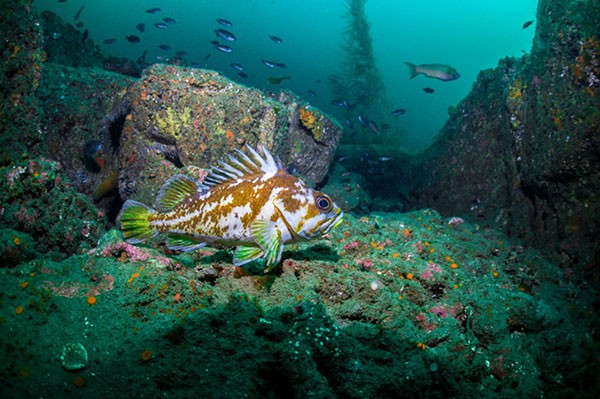Hello Nature readers, would you like to get this Briefing in your inbox free every day? Sign up here.
How some fish live for centuries
Some Pacific Ocean rockfishes can live for more than 200 years. Their secret to longevity: slowly growing large in the frigid depths. Researchers have found that the longest-lived rockfishes, a group that includes several species that can live for more than 105 years, have genes that indirectly affect lifespan by influencing size and adaptability. They also have more copies of genes linked to DNA maintenance and resisting the inflammation that often comes with age.
Scientific American | 5 min read & Nature Research Highlight | 1 min read (Nature paywall)
New Alzheimer’s drugs under scrutiny
Eli Lilly and other pharma firms have begun submitting their anti-amyloid drug hopefuls for approval by the US Food and Drug Administration (FDA). But questions linger over the controversial precedent set by Biogen's aducanumab, which was approved despite an independent advisory committee voting to reject it. Researchers are asking how much benefit amyloid-lowering drugs offer patients, when solid data will be available on whether they improve cognition and how the FDA will tackle the approval process.
The world’s biggest sources of sewage
Most sewage pollution comes from just a few locations around the world. Researchers analysed faecal pathogens and nitrogen from human wastewater entering the ocean at nearly 135,000 sites. They found that 25 watersheds contribute almost half of the nitrogen, with the Yangtze River expelling the most — 11% of all global nitrogen from human waste. The Nile, the Mississippi and the Danube also rank among the highest emitters. The results could help conservationists and sanitation specialists to pinpoint where sewage treatment can make the biggest impact.
Scientific American | 5 min read
Features & opinion
When Finnish researchers took on the trolls
When a high-profile journalist in Finland took researchers to task for wasting public money and the Twitter trolls piled on, scientists hit back — with positivity. Using the hashtag #minätutkin (‘#I research’), they took to the social network to explain their research in a nutshell, explains Sami Syrjämäki, head of publications for the Federation of Finnish Learned Societies in Helsinki. After a run as the most popular Twitter hashtag in Finland, the campaign calmed the tone of the discussion, raised the profile of research and connected scientists with each other. The Finnish government even backed off from cuts to research funding. “It might have been a coincidence, but I think the campaign had a part to play,” says Syrjämäki.
Friction: there's the rub
In her new book Sticky, physicist and science writer Laurie Winkless investigates friction, a force whose effects are felt in every moment of our lives, but which stubbornly resists attempts at theoretical explanation. Winkless reminds us that friction is also big business: billions of dollars — and billions of tonnes of carbon emissions — could be saved if researchers and engineers could make cargo ships cut through the water more easily, or minimize car tyres’ rolling resistance.
Scientists lament stagnating salaries
Fewer than half of respondents to Nature’s 2021 salary and satisfaction survey reported feeling positively about their career prospects, a clear sign of pessimism at a time of widespread funding shortages, intense competition for jobs and the disruptions of a global pandemic. By comparison, the proportion was nearly 60% in 2018, when the last survey took place. However, the survey also highlighted the wide diversity of scientific lives and the struggles of many stand in contrast to the success of others. The self-selected survey drew responses from more than 3,200 working scientists around the world.
China sticks with zero-COVID strategy
Earlier this month, a single case of COVID-19 led to lockdown at Shanghai Disneyland and quarantine for 34,000 people inside. It’s an extreme example of China’s COVID-19 elimination strategy — an approach that has been abandoned by once hard-line countries such as New Zealand. The BBC explores the public-health and political reasons why the country is sticking with zero COVID.
Where I work
Biochemist Tammy Hsu is researching microbial fermentation and other clean ways to make dyes. “Indigo dye, for example, is usually made from petroleum-derived aniline in a high-temperature process that involves formaldehyde and cyanide,” she says. “Instead of using toxic chemicals, we feed the microbes and they make the dye.” This dye must reproduce the special way in which indigo bonds with the cotton, which gives denim its iconic faded look. Products dyed with indigo made by Huue, the start-up company Hsu co-founded, could be on the market within a year. (Nature | 3 min read)
"fish" - Google News
November 17, 2021 at 06:51PM
https://ift.tt/3HvGB3N
Daily briefing: How some fish can live for centuries - Nature.com
"fish" - Google News
https://ift.tt/35JkYuc
https://ift.tt/3feFffJ
Bagikan Berita Ini

















0 Response to "Daily briefing: How some fish can live for centuries - Nature.com"
Post a Comment